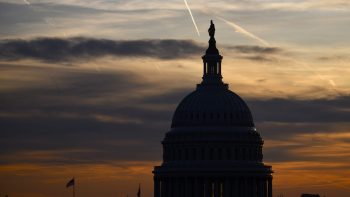Carbon cash will end up in wrong hands
TEXT OF STORY
Kai Ryssdal: House Democrats say they’ve come to terms on a climate-change bill. They’ve cut back on some of the more aggressive parts of their original plan so they can get the thing passed by Memorial Day. The revised bill still does lay out a pretty ambitious agenda. It reduces greenhouse gas emissions 17 percent by 2020 and increases the amount of power that’s produced using renewable sources. Commentator David Frum says it sounds pretty good, but the approach is all wrong.
DAVID FRUM: Barack Obama’s responsibility era has lasted barely four months.
On Monday, the president stood in the East Room of the White House with leading health-care executives to announce $2 trillion in hypothetical — and probably imaginary — savings in health spending over the coming decade.
His revenue side is revealing itself as even more of a fantasy.
The Obama administration has been counting on big revenues from its climate-change plans. It would sell permits to emit carbon dioxide, which is generated by burning fossil fuels like oil and coal. The administration reckoned the value of these permits at somewhere between $700 billion and $1.8 trillion over 10 years.
But that estimate was always based on disregarding the giant favor-selling machine we know as the U.S. Congress.
The last round of carbon legislation in Congress, back in 2007, ended up giving large emission rights away for free to powerful interest groups. The interests have not got any weaker since.
Which is why as the current legislation moves through Congress, more and more of the permits are again being given away for free: up to 75 percent in the versions of the bill being debated this week. Environmentalists go along with the giveaway because they get something they want: a mandate on utilities to use costly wind and solar and to pass the cost on to consumers.
Consumers will pay more for electricity. But instead of paying it to the U.S. Treasury, they will pay it to utility companies.
All of this was predictable from the start. More than predictable: predicted.
Democrats rejected the simple and rational alternative — a tax on carbon dioxide — in favor of a complex system of permits and mandates. Democrats preferred a more interventionist approach because it gives government more power to favor pet technologies like wind and solar over lower-cost nuclear. And as any utility can tell you: power costs money.
RYSSDAL: David Frum is a resident fellow at the American Enterprise Institute.
There’s a lot happening in the world. Through it all, Marketplace is here for you.
You rely on Marketplace to break down the world’s events and tell you how it affects you in a fact-based, approachable way. We rely on your financial support to keep making that possible.
Your donation today powers the independent journalism that you rely on. For just $5/month, you can help sustain Marketplace so we can keep reporting on the things that matter to you.


















